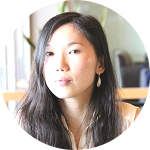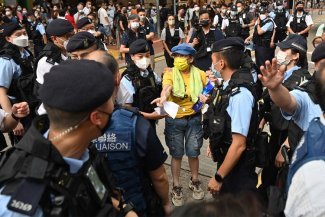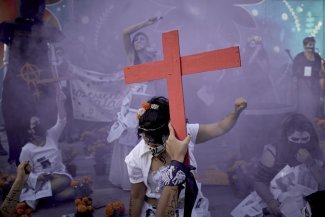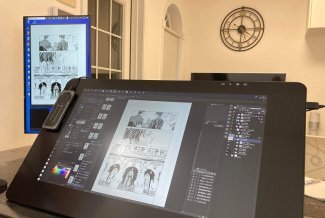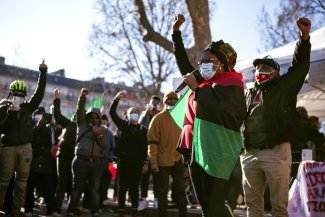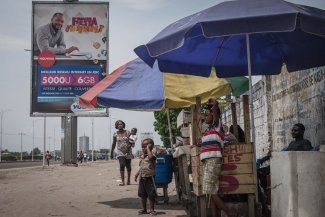Secondary school students and supporters form a human chain during a rally against the pro-Beijing Hong Kong government in Sha Tin, Hong Kong, China, on 19 September 2019.
For more than a decade, discussing – among other topics – issues about contemporary China with his students had been an enjoyable part of Cyrus Chan’s* job as a liberal studies teacher in Hong Kong. He had relished the freewheeling exchange of ideas while guiding the young to argue with reason.
These days, however, the 44-year-old schoolteacher is feeling inhibited. During a recent class, he broached the topic of air pollution in China. With a little trepidation, he talked about smog in big Chinese cities. Then, one student who has a good rapport with Chan raised his hand, flashed his teacher a mischievous smile and quipped: “Wow, sir, you keep talking about China. How about switching to India?” Chan immediately got the cue – he knew the boy was trying to protect him – and so he smiled back and talked about pollution in New Delhi.
In the last few months, subtle self-censorship of this kind has been fast creeping into the classrooms of Hong Kong schools. Following the city’s anti-government, anti-China protest movement in 2019, predominantly led by young people, Beijing and the pro-Beijing Hong Kong government are now on a mission to overhaul the city’s education sector. One key objective is to inculcate in Hong Kong’s rebellious youth a sense of patriotism and national pride through a mix of education reforms and what critics describe as ‘scare tactics’, such as striking off teachers for ‘smearing’ China and the Hong Kong government “without basis”.
So all of a sudden, teachers like Chan find themselves walking on eggshells in classrooms when they talk about anything that might paint China in a negative light or that could be interpreted as sounding secessionist.
Students are aware of the deteriorating situation, too. Some, like the boy in Chan’s class, mind their tongues and take it upon themselves to keep their teachers out of harm’s way.
“In the past, everyone could speak freely. Now there is this invisible red line. I would try to steer clear of certain things, and some of my students would tease me as a way to tell me to be careful. You never know when some pro-Beijing student or their parents will report you,” explains Chan.
This so-called ‘white terror’ has no precedent in Hong Kong’s education sector, home to more than 1,000 primary and secondary schools and some of the best universities in Asia. Until recently, freedom of speech in classrooms and academic freedom were a given in the former British colony. Fear of reprisals from the authorities for what was uttered on school campuses was unheard of, whereas in mainland China, schools and universities are strictly controlled and few can deviate from the Communist Party line without getting into trouble.
An ominous sign
In the past months, however, things have changed. As the months-long, sometimes violent protest movement died down in early 2020, Hong Kong’s education sector has become a target on Beijing’s radar.
For freedom-loving Hongkongers, an ominous sign came last January when Luo Huining, Beijing’s top envoy to Hong Kong, wrote in a newspaper article that “patriotism is a serious matter”, quoting verbatim a remark made by Chinese President Xi Jinping. Luo said Beijing supported the Hong Kong government to strengthen young people’s “national awareness and national identity”. To many people in Hong Kong, the “patriotism” and “national identity” advocated by Beijing simply means showing absolute loyalty to the Communist Party.
A few months later, a cascade of developments sent chills throughout school campuses. In May, the Education Bureau made the unprecedented move to demand that the local exam body scrap a history exam question, which read: “Japan did more good than harm to China in the period of 1900-45. Do you agree?” The education minister said there was no room for the question, which “hurt the feelings of Chinese people”. An exam official who resigned, allegedly under political pressure, later accused the authorities of “purging those they don’t want without disguise”. He compared the incident to China’s Cultural Revolution, a violent, decade-long social-political movement launched by Mao Zedong in the 1960s to eliminate political rivals.
In June, a pro-Beijing school decided not to renew an art teacher’s contract, citing her political views and her allowing a student to play a Hong Kong protest song in a music exam. In August, it was revealed that some school textbooks had been revised by publishers, with references to separation of powers and protests deleted. Two months later, further shockwaves were sent through the city when a primary school teacher was disqualified for life. Authorities accused the teacher, the first in Hong Kong to be deregistered because of the content of their lessons, of promoting Hong Kong independence in a worksheet, which carried questions relating to a pro-independence activist. Also implicated were the school principal and a few other teachers, who were reprimanded for not reporting the ousted teacher. Several weeks later, a teacher at another school was struck off permanently, this time for giving pupils an incorrect account of the Sino-British Opium War in the 1840s. And just last week it was announced that yet another teacher could be removed for the alleged use of “inappropriate and biased teaching materials”.
In each of the deregistration cases, it was some pro-Beijing media outlet in Hong Kong that brought the matter to light. A controversy was then whipped up, and the teachers were criticised, investigated and fired, a treatment critics deem disproportionately harsh.
Ip Kin-yuen, vice president of the Professional Teachers’ Union, says the “white terror” has put educators on edge. “The enormous political pressure facing teachers today is without precedent in the history of Hong Kong. The chilling effects are sweeping across school campuses, curricula and even exam papers,” says Ip, also an ex-lawmaker representing the education sector.
“Teachers have lost their sense of job security. They don’t know where the red line is. So everyone is adopting a reserved approach.”
It is not only the education community that is in the grip of anxiety. On 30 June last year, one hour before Hong Kong marked the 23rd anniversary of its return to China in 1997, Beijing imposed a draconian national security law on the city. Overnight, a deep sense of fear took hold among many Hongkongers. Critics say the law, which punishes crimes of secession, subversion, terrorism and foreign collusion, marks the end of the city’s freedom of speech and promised autonomy from Beijing. So far over 90 people, including dozens of pro-democracy politicians and the chair of the Hong Kong Confederation of Trade Unions Carol Ng, have been arrested under the law, which carries a maximum punishment of life imprisonment.
Meanwhile, what remains of Hong Kong’s freedoms continues to be chipped away at an alarming rate: critical journalists have been fired and pro-democracy lawmakers disqualified; some court judges have been criticised by state-owned media for being too ‘lenient’ to protesters; well-known activists have been rounded up or jailed for protest-related charges while others have gone into exile. To date, some 10,000 people have been arrested in connection with the protest movement. Among them, 40 per cent are students, and over 2,300 people have been charged.
Liberal studies in the crosshairs
In what critics see as the breakdown of the cornerstones of Hong Kong as a free society, education has not gone unscathed. In fact, it is believed to be bearing the brunt of Beijing’s abrupt encroachment on the city’s civil liberties.
Lew Mon-hung, political commentator and businessman, tells Equal Times: “Many protesters who clashed with police and set fire to public facilities in 2019 were young people. Beijing thinks something must be wrong with Hong Kong’s education system.”
The 72-year-old, who swam all the way from southern China to Hong Kong in 1973 to flee from the Cultural Revolution, adds: “It took the Communist Party 22 years to take power, but 23 years have passed and it still hasn’t won the hearts of young Hongkongers. It must be thinking: ‘What the heck is going on?’ The future belongs to young people. So Beijing is targeting the education sector. It wants to brainwash the young and win them over.”
In Beijing’s blueprint for reforming the minds of young Hongkongers, one school subject has become the main target. Liberal studies, a compulsory subject for senior secondary students, was launched in 2009 to challenge rote learning (endemic in Chinese culture) by cultivating critical thinking and cross-discipline analytical skills. Study modules include Hong Kong today, modern China and public health. Since the anti-government Umbrella Movement in 2014, however, the programme has been a thorn in the flesh of pro-Beijing politicians who blame it for inciting young people to political activism.
The antagonism intensified during the 2019 protest movement, when pro-Beijing media and politicians claimed liberal studies had fuelled violent protests. Former Hong Kong chief executive Tung Chee-hwa, on whose watch liberal studies was launched, called the curriculum a “complete failure”.
But Ip says: “It’s so unfair to blame a school subject. It’s the government that fails to listen to people and police brutality that led to the protest movement.”
Avery*, a 17-year-old student and member of a student activist group, attributes her awareness of her cultural identity as a Hongkonger to liberal studies. “A few years ago, when I was still a know-nothing kid, our teacher showed us a cartoon strip about queue-jumping culture in China,” says Avery. “That got me thinking about the cultural differences between Hong Kong and mainland China. It’s an inspiring subject.”
Younger students will probably have a different experience of the subject. In November 2020, the education authorities announced a liberal studies revamp. Starting from September 2021, the programme will take on a different name (as yet to be announced), topics and lesson hours will be halved, more emphasis will be put on China’s achievements and national security, and students will have to visit mainland China.
Four teachers interviewed by Equal Times deem the reform an attempt to brainwash young people into unquestioning patriotism. They also worry it will undermine teacher-student relations, which have already suffered since the passing of the security law.
Nevertheless, Hong Kong’s top leader Carrie Lam has denied her administration was under pressure from Beijing to launch the reform. She blames the way the subject has been taught, saying it has led students to “mistake critical thinking as to disagree with everything”.
By comparison, local universities, some of which were the theatre of fiery sieges during protests in November 2019, have not felt the heat of the current situation as much, although there has been documented pressure on certain pro-democracy scholars in recent years. According to a professor (who asked to remain anonymous) at the University of Hong Kong (HKU), the crackdown on civil liberties and push for a more patriotic approach within classrooms have so far produced “no visible impact” on academia. “People may engage in a bit of self-censorship...but my observation is that, by and large, my colleagues are continuing to go about their business.”
Still, uncertainty is looming large. Recently, HKU, the city’s top university, took the controversial step to appoint two professors from a university in mainland China to senior management roles. One of them, Max Shen, was previously listed by the mainland university as a Communist Party member, but he dismissed that as a technical error. In December, the Chinese University of Hong Kong folded its acclaimed China studies centre into the university library. Some scholars believe the move was politically driven and will eventually hinder academic research.
All these incidents are a cause of concern for academics. “The biggest concern is of course direct intervention in university policy...[.] Diktats driving research into one direction would disrupt the natural flow and mix of ideas, which is the lifeblood of any university,” the HKU scholar notes.
“Patriotism is just an accessory”
In China, patriotism has always been featured in formal or informal education since the Mao era. Following the 1989 Tiananmen Square massacre, Chinese leaders reflected on the root of the political crisis that almost brought down the Communist Party. Their conclusion was that they had made the grave mistake of not giving enough attention to “ideological and political education” in the decade leading up to the 1989 pro-democracy student movement.
In 1991, China launched a sweeping patriotic education campaign targeting primary and middle schools. The main thrust was to underscore China’s past suffering at the hands of imperial powers and the Communist Party’s achievements. It is a campaign that continues today and, since Xi took power in 2012, has become more intense and sophisticated. Currently, pupils in mainland China have to study ‘socialism with Chinese characteristics in Xi Jinping’s new era’. Books considered illegal or inappropriate, including George Orwell’s 1984 and Animal Farm, have been removed from school libraries or burned to ashes. The party has also produced animated videos carrying nationalistic messages and targeting internet-savvy youngsters.
Have these relentless efforts borne fruit? According to a new study published by Shanxi University in northern China, Chinese teenagers born after 1998 are more patriotic than their predecessors.
Meanwhile, the ’Little Pink’ phenomenon, seems to suggest that there is no shortage of patriotic youngsters in China. Angry and in their early twenties, these keyboard warriors have a penchant for promoting cybernationalism and bullying critics of China.
But such patriotism is self-serving, says renowned Chinese dissident writer Liao Yiwu, who was imprisoned in China in 1990 for writing the long poem Massacre about Tiananmen. “Before I went to jail, Chinese people were truly patriotic. When I was released in 1994, the economic reform had been launched. Money became the religion. Today, patriotism in China is just an accessory. No one is patriotic unless it can bring people safety and benefits,” says the 62-year-old, who left China for Berlin in 2011.
Unlike in mainland China, pushing patriotic education in semi-autonomous Hong Kong has been no straightforward matter. The Hong Kong government’s first formal attempt to instil Chinese national identity in the young came in 2012 – and failed stunningly. That year, tens of thousands of people ringed the government headquarters for days in protest over plans for a mandatory school curriculum called ‘moral and national education’, which students, teachers and parents said was Beijing’s propaganda to brainwash the young. The staunch public resistance eventually forced the authorities to withdraw its plans.
Yet this time round, the government, with its assertive approach and with Covid-19 social distancing rules rendering mass protests impossible, is pressing ahead with the liberal studies reform. Will it succeed in taming young Hongkongers? Chan doubts it will be that easy to brainwash people in a city that has for decades been a free place. But a friend of his, also a liberal studies teacher, is pessimistic.
“Turning our young into passionate patriots may be impossible, but it wouldn’t be difficult to transform them into apathetic citizens, just like young people in mainland China. The government could use scare tactics to make them feel helpless and believe they can’t change anything,” the teacher says. “All we can do is try our best to teach them to think critically.”
Lew, on the other hand, believes that so long as there is free flow of information, young Hongkongers will not be indoctrinated. “You can’t brainwash people without blocking the flow of information. Hong Kong’s financial hub status is still an important asset for Beijing, and free flow of information is indispensable for any financial centre,” he says.
But even this widely held belief is now being cast into doubt. Shortly after Lew spoke to Equal Times, it transpired that Hong Kong police ordered at least one of the city’s major internet service providers to block access to a website related to the protest movement on national security grounds. The incident has drawn widespread concerns over internet freedom in Hong Kong. It may also have implications on how young Hongkongers get to understand the world outside of the classroom, as their city continues to change at a dizzying pace.



